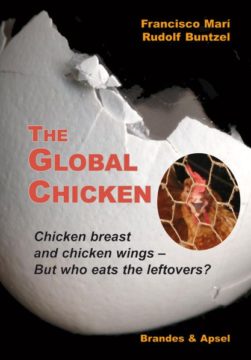Chicken breast is popular and a favourite ingredient in calorie-conscious diets. Nowadays, poultry is very selectively used in German cooking – either breast, leg or wing. Whole chicken as a meal has disappeared from the menu. What happens to the rest of the chicken? These changes in the global trade of chicken
meat have not really been taken seriously yet. The chicken industry has been concentrated, globalised and industrialised to an extent unknown in any other sector of agriculture.
All we are left with is the illusion of chicken. The more it is cut up and processed, the greater the power wielded by large companies, the more chicken farming becomes industrialised and global. And the results, which are happening worldwide, are smallholdings are being ruined leading to livelihoods being destroyed in Africa, the occurrence of new types of animal epidemics, animals becoming simply raw material suppliers, consumers no longer knowing
where their food comes from.
The authors have studied the convoluted trade fl ows of ‚global chicken‘. They have talked to experts in the industry, debated with decision makers in politics and the economy, and carried out fi eld research. The results of their research are presented in this well-documented and knowledgeable book.
The authors:
Rudolf Buntzel has a PhD in Economics. He is an agricultural expert and is the Church Development Service’s (EED) spokesperson on world food issues. His book Risiko Grüne Gentechnik [Green gene technology – the risks] was
published by Brandes & Apsel in 2005.
Francisco José Marí Lopez is a psychologist and freelance project manager, currently project coordinator and consultant to the EED, where one of his projects is ‚Agricultural exports to West Africa – Don’t send chickens‘.
- Veröffentlicht am Freitag 20. Dezember 2024 von Brandes & Apsel
- ISBN: 9783860998793
- 196 Seiten
- Genre: Gesellschaft, Politik, Sachbücher, Wirtschaft
